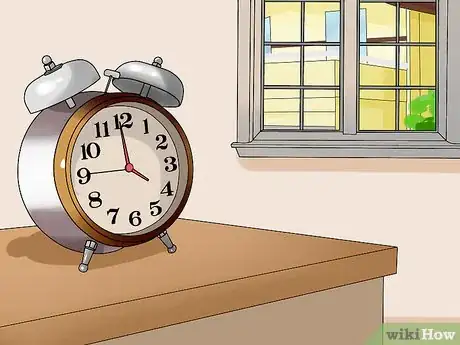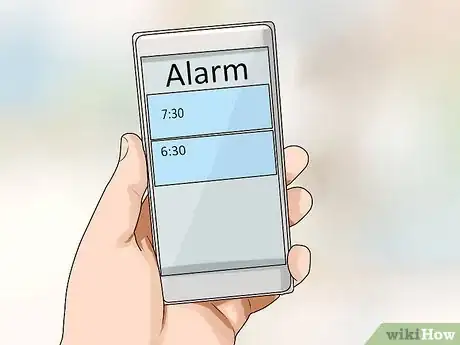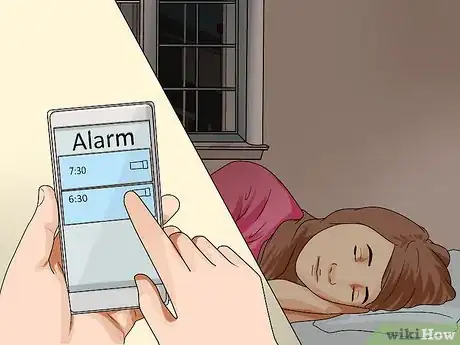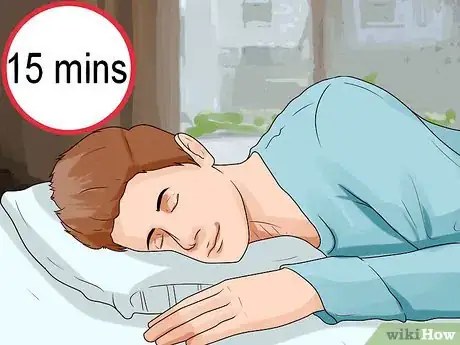This article was co-authored by Alex Dimitriu, MD. Alex Dimitriu, MD is the Owner of Menlo Park Psychiatry and Sleep Medicine, a clinic based in the San Francisco Bay Area with expertise in psychiatry, sleep, and transformational therapy. Alex earned his Doctor of Medicine from Stony Brook University in 2005 and graduated from the Stanford University School of Medicine's Sleep Medicine Residency Program in 2010. Professionally, Alex has dual board certification in psychiatry and sleep medicine.
There are 8 references cited in this article, which can be found at the bottom of the page.
This article has been viewed 72,047 times.
Although you may love your sleep, you also know that waking up and doing other things is pretty important. Sleep too long and you could fail classes, get fired from your job, or miss fun and exciting activities with friends. Most of your goals in life require climbing out of bed in time for important events and activities. Finding a way to wake up and get moving is critical to living your life successfully.
Steps
Waking Up On a Regular Schedule
-
1Find a dependable alarm clock.[1] You want something that will go off at the right time every day. Something with enough volume to knock you out of a deep sleep. Make sure it has a backup battery. That way if the power goes out it will still wake you up.
- You don't have to spend a lot of money to find a dependable alarm clock.[2] Less sophisticated alarm clocks with rotating dials can be more reliable than "smarter" digital clocks you have trouble understanding the instructions for.
- Be wary of alarm clocks that have an off button too close to the snooze button. If you hit off instead of snooze you could be in big trouble later.
- If you use your phone as your alarm clock, make sure to set it up so the alarm volume is loud every time you need it. You may want to establish a policy of never turning your alarm volume down.
-
2Place your alarm clock in an optimal position.[3] If it’s too easy to snooze the alarm right beside you, move it! Find a place that it will still be loud enough to wake you up but will force you to get up to turn it off. You still want to be able to see what time it is though. Keep it in a location you can see but have to get up to turn the alarm off.Advertisement
-
3Set your alarm clock in advance. If you are getting up on a regular schedule then you need to train yourself to wake up at the same time everyday. You can start by setting your alarm clock to go off at the same time everyday. Your body will gradually remember this time. So much so that you may eventually start waking up a few minutes early in anticipation of your alarm going off.[4]
- If you know it takes some time for the alarm to wake you up then set your alarm fifteen minutes before you need to be up.
-
4Go to bed at the same time every day. Just as important as setting your alarm for the same time every day is going to bed at the same time. This means you will get the same amount of sleep each night. Preferably in the 7-8 hour range. Your body will adjust to get tired at the same time each night. With the proper amount of rest, your body will not resist waking up so much.
-
5Get out of bed when you wake up. Although you may be tempted to hit the snooze, you need to actually stand up. Stand up. Walk around the room. Turn lights on so you don't run into anything. This gets you moving even if you don't feel awake yet. Your body will wake up a little more each moment you force it to stay vertical.
- As soon as you get up you may opt to take a shower or walk outside. Any sort of routine that gets you up and moving helps.
Waking Up On an Odd Schedule
-
1Establish a proper sleeping environment. However you normally sleep, that's what you want to establish with your odd schedule pattern. If you usually sleep when it’s dark outside, find a dark room. If you like to sleep with the TV on, make sure there's a TV where you sleep. Try to create a place that effectively mimics your normal sleeping place.
-
2Find an alarm clock with multiple alarms.[5] Find an alarm clock that has alarms for different days and multiple times. If you are on an odd schedule, you may need more than one alarm clock to wake you up. Some alarm clocks have different settings for each day. Some alarm clocks (especially those on a cell phone) can be set to go off multiple times a morning--even if you turn an alarm off, the next one will come on.
- If you have a cell phone you may be able to find very sophisticated alarm clocks in your app store. Some cell phone alarm clocks make you answer math problems or scan a bar code in your bathroom before it turns off.[6]
-
3Set up your alarm clock to meet your needs. Waking up on an odd schedule robs you of establishing a daily circadian rhythm. If you can't get up at the same time everyday your body may resist an alarm clock more readily. Set your alarm clock based on your needs.
- Try to wake up at as close to the same time everyday as possible unless your needs vary greatly. For example, if you can establish a regular sleep schedule--even if that means waking up hours before you need to be somewhere--you should do try to go to bed and wake up at the same time.
-
4Have a backup plan in place. This usually takes the form of another person. You may ask your partner to wake you up. Maybe a parent or child could call you on the phone to make sure you wake up. If you know you need to be up and in the car for a long trip you may simply sleep in the car. You may still be asleep halfway through the trip.
-
5Get out of bed as soon as you wake. Getting up and moving will make a big difference. Turning lights on or moving into rooms with already-awake people. You may think about taking a shower to wake yourself up a little more. Don't stay in bed though. It’s too comfortable and sleep will draw you back. Get out of bed and get moving so your body will force itself to wake up so you don't hurt yourself walking around.
- Be careful of ideas like "If I don't turn the alarm off I won't fall back to sleep." If you are tired enough you might fall asleep with the alarm blaring. Do this enough and your alarm may not wake you up at all.
Waking Up From Napping
-
1Find a quiet place. Somewhere nobody will interrupt you. Probably somewhere away from your desk, phone, or computer. That way you can rest in peace. You only have a short amount of time for a power nap so you want to make the best of it. If you have a secretary, you may ask them to hold all calls and stop anyone from coming in.
- Be careful that your quiet place is not too secluded or remote. Make sure someone knows where you are at in case they need you.
-
2Decide on the length of your nap. Some naps last 15 minutes while others last several hours. Decide how long you want to sleep and limit yourself to that. If you have a limited amount of time for your nap, adjust to ensure you have some time to wake up before your next task.
- You may want to vary your nap times based on your own sleep cycle rhythms. Some naps may also be better for achieving different results. A 20 minute nap is good for improving your motor skills while a 60-90 minute nap improves decision making.[7]
-
3Set an alarm.[8] When you are napping you may or may not have your usual alarm clock. If you are using your usual alarm clock, set it as you usually do. You may use a wake-up call at a hotel or the alarm on your phone. Travel alarms work well in these situations. If you are at your desk you may try setting up an alarm on your computer.
- Even if your usual alarm clock is available you may want to use a different alarm clock instead. If you alter your regular alarm clock you may forget to reset it later. This could cause you to be late in the morning.
-
4Have a backup plan for waking up. Anything will do here. Hotel wake-up calls. Friends, family, colleagues, and co-workers will often help too. Setting multiple alarms on multiple devices can be helpful too. That way you don't give in and sleep for too long in the middle of the day.
-
5Stand up as soon as you are woken up. Although you may want to turn the alarm off and fall back to sleep, don't. Stand up instead. Get moving to get your mind going. You may even want to set your alarm across the room so you have to get up to turn it off. Turn some lights on or stare out a window if it is sunny.
Waking Up When You Feel Sleepy
-
1Stay standing as much as possible. Walk around a little if you can. Resist the urge to sit or lay down. Also avoid leaning up against anything. If your eyes are heavy, you may doze off. As long as you are standing up and moving you should be able to avoid falling asleep.
-
2Splash water on your face. Cold water works best. The colder the better. Something to sort of shock you into waking up. You can easily excuse yourself to the bathroom to do this. The goal here is to make yourself uncomfortable. If your face is cold you will be less likely to fall asleep. If you have short, combed-over hair you could put cold water on your scalp too.
-
3Lower your body temperature.[9] This is a lot easier in winter or in cold offices. Take off that jacket or scarf. Roll up your long sleeves. Grab a glass of ice cold water. Take a few gulps, refill, and keep it at your desk. If you have a space heater at your desk, turn it off. You may even want to turn a fan on to keep you cooler.
-
4Raise your heart rate. You may opt to start doing things more quickly. Stand and march in place while at your desk. If you can take a quick break, do jumping jacks or run in place. This will get your heart rate up. More blood will be moving to your brain and your lungs will start working harder to provide oxygen to the blood. As your heart rate rises you will be more awake and alert.
- Taking a shower will also influence your cardiovascular system by raising your blood pressure.
-
5Engage your mind in an entertaining task. If you are tired, a monotonous task will prompt your eyes to become very heavy. If you can switch tasks and do something different, try that instead. If it involves paying close attention to something or someone else that's even better. When our minds are engaged we become more awake and alert.
- If you can listen to something on the radio or on your phone do so. If you have a favorite radio station or upbeat playlist or music album listen to that and sing. Try listening to a book on tape. If you like keeping up with current events, news radio may also keep your mind engaged.
-
6Eliminate the source of your tiredness. If you are unable to shake your midday sleepiness you may not be getting enough rest in general. Consider establishing a regular sleep routine and avoiding snacks and beverages that can make you sleepy.[10] [11] Consult a physician if you have a regular sleep schedule and still feel tired during midday.
Expert Q&A
Did you know you can get expert answers for this article?
Unlock expert answers by supporting wikiHow
-
QuestionWhy am I still tired after getting enough sleep last night?
 Alex Dimitriu, MDAlex Dimitriu, MD is the Owner of Menlo Park Psychiatry and Sleep Medicine, a clinic based in the San Francisco Bay Area with expertise in psychiatry, sleep, and transformational therapy. Alex earned his Doctor of Medicine from Stony Brook University in 2005 and graduated from the Stanford University School of Medicine's Sleep Medicine Residency Program in 2010. Professionally, Alex has dual board certification in psychiatry and sleep medicine.
Alex Dimitriu, MDAlex Dimitriu, MD is the Owner of Menlo Park Psychiatry and Sleep Medicine, a clinic based in the San Francisco Bay Area with expertise in psychiatry, sleep, and transformational therapy. Alex earned his Doctor of Medicine from Stony Brook University in 2005 and graduated from the Stanford University School of Medicine's Sleep Medicine Residency Program in 2010. Professionally, Alex has dual board certification in psychiatry and sleep medicine.
Sleep Specialist If you didn't sleep enough earlier in the week, it can take at least 5-7 days of good sleep to catch up. It's also important to realize that the quality of your sleep matters as much as the quality. If you're sleeping in a loud or hot environment, if you have sleep apnea, or if you're in pain, it's going to disrupt your sleep.
If you didn't sleep enough earlier in the week, it can take at least 5-7 days of good sleep to catch up. It's also important to realize that the quality of your sleep matters as much as the quality. If you're sleeping in a loud or hot environment, if you have sleep apnea, or if you're in pain, it's going to disrupt your sleep.
References
- ↑ http://www.businessinsider.com/how-to-wake-up-earlier-2013-1
- ↑ http://lifehacker.com/5934145/how-to-stop-snoozing-and-get-yourself-out-of-bed
- ↑ http://lifehacker.com/5934145/how-to-stop-snoozing-and-get-yourself-out-of-bed
- ↑ http://mentalfloss.com/article/53710/why-do-i-always-wake-5-minutes-my-alarm-goes
- ↑ http://lifehacker.com/5934145/how-to-stop-snoozing-and-get-yourself-out-of-bed
- ↑ http://www.boredpanda.com/20-annoyingly-creative-alarm-clocks/
- ↑ http://www.webmd.com/balance/features/the-secret-and-surprising-power-of-naps
- ↑ http://lifehacker.com/5934145/how-to-stop-snoozing-and-get-yourself-out-of-bed
- ↑ http://www.entrepreneur.com/article/250899
About This Article
If you are having trouble waking up, try putting your alarm clock or phone far from where you sleep, so that you have to get entirely out of bed in order to turn it off. You can also try sleeping with your blinds open, since natural light shining into your room will signal to your brain that it is time to wake up. Once you are out of bed, try drinking a caffeinated beverage like coffee or tea, taking a shower, or doing some exercise to help you feel more energized. You can also try to wake up more easily by changing what you do in the morning. Try making early morning plans with a friend, or motivating yourself to get out of bed with a reward like a delicious breakfast, your favorite podcast, or music. Finally, try sticking to a consistent sleep schedule. Your circadian rhythm works most effectively when you go to bed and wake up at the same time each day. Overtime, your body becomes conditioned to a more regular schedule, and it will be easier to fall asleep and wake up at the same time each day. If you want to learn how to feel more awake throughout the day, keep reading the article!














































































